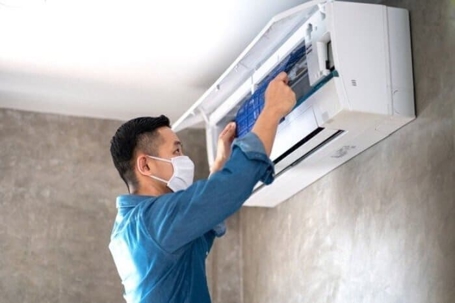HVAC (Heating, Ventilation, and Air Conditioning) compressor is vital to any air conditioning system. It is crucial in maintaining indoor comfort by regulating temperature and humidity levels. As technology evolves, the costs of replacing a compressor can vary based on several factors, including brand, system type, and regional pricing differences. This guide will provide homeowners with comprehensive insights into the cost of replacing an HVAC compressor, ensuring they make informed decisions when faced with replacement.
What Is an HVAC Compressor, and Why Is It Important?
The Role of the Compressor in Your HVAC System
The compressor acts like the heart of your HVAC system, pumping refrigerant through the system to facilitate the heat exchange necessary for cooling your home. During this process, the compressor pressurizes the refrigerant, raising its temperature as it absorbs heat from the indoor air and releases it outside. This continuous cycle maintains a relaxed and comfortable environment in your home, which is why a properly functioning compressor is vital.
An HVAC system cannot effectively cool the home without a reliable compressor. A failing compressor can lead to inadequate cooling, increased energy bills, and, ultimately, a breakdown of the entire system. Therefore, understanding the symptoms of a failing compressor and recognizing when replacement is necessary can save homeowners time and money in the long run.
Signs Your Compressor May Need Replacement
Homeowners should be vigilant about the performance of their HVAC systems. Some common signs that indicate a compressor may need replacement include:
- Unusual Noises: Sounds like clanking, banging, or hissing may indicate that the compressor is failing, which could lead to a total breakdown if ignored.
- Poor Cooling Performance: If your HVAC system struggles to cool your home or has noticeable temperature fluctuations, the compressor might not operate efficiently.
- Increased Energy Bills: A sudden spike in your energy bills without any significant change in usage often points to an issue with the compressor.
- Frequent Cycling: If the system frequently turns on and off, this could indicate a failing compressor that cannot maintain the desired temperature.
- Warm Air from Vents: The compressor may not function correctly if your AC blows warm air rather than cool air.
Understanding the Cost of HVAC Compressor Replacement
Overview of Factors that Affect Pricing
The cost of replacing an HVAC compressor can vary widely based on several factors. These include:
- Type of HVAC System: Central air conditioning systems typically have different costs than ductless mini-splits and heat pumps.
- Compressor Size and Capacity: The size of the compressor required for your home can significantly impact the overall cost.
- Brand and Quality: Different brands offer various quality levels and warranties, affecting the replacement cost.
- Labor Costs: The cost of labor can vary significantly based on your location and the complexity of the installation.
- Additional Repairs: The need for other repairs or upgrades during the compressor replacement can increase overall costs.
Typical Price Ranges
On average, homeowners can expect to pay anywhere from $800 to $3,200 for the complete replacement of an HVAC compressor. This price range reflects the cost of parts and labor. Specific factors such as the type of compressor or HVAC system can significantly influence these costs. For example, compressors for larger systems typically will be more expensive.
Factors That Impact the Cost of HVAC Compressor Replacement
Type of HVAC System
The type of HVAC system you have will significantly influence the compressor replacement cost. Here’s a breakdown:
Central Air Conditioning
Central air conditioning units typically require larger compressors to cool larger areas effectively, so replacing an HVAC compressor costs between $1,200 and $2,500.
Ductless Mini-Splits
Ductless systems have varying costs, often from $800 to $3,000, depending on their capacity and efficiency. They are generally more energy-efficient, leading to potential long-term savings in energy costs, which can offset some of the replacement costs.
Heat Pumps
Heat pumps can also range from $800 to $3,000 for compressor replacement. The overall efficiency of a heat pump can affect the compressor’s price, as energy-efficient models often cost more upfront but provide lower operating costs.
Compressor Size and Capacity
The size of the compressor is crucial in determining the performance and cost of your HVAC system. Compressors are measured in tons, with one ton equal to 12,000 BTUs of cooling capacity. For reference, a larger home will require a larger compressor, leading to higher costs.
Typical Costs Based on Size
- 1.5-ton: $800 – $1,400
- 2-ton: $900 – $1,500
- 2.5-ton: $1,000 – $1,700
- 3-ton: $1,200 – $2,000
- 3.5-ton: $1,300 – $2,200
- 4-ton: $1,500 – $2,500
- 5-ton: $1,800 – $3,000
Brand and Quality of the Replacement Compressor
The brand of the replacement compressor is a significant component of the total cost. Popular brands such as Momentum AC & Electric, Copeland, and Lennox offer a range of products with varying prices and quality levels.
Overview of Popular HVAC Compressor Brands
- Momentum AC & Electric: Known for high efficiency and reliability, it is a preferred choice for many homeowners. Its competitive pricing and robust warranty offerings enhance its value.
- Copeland: Offers a wide selection of compressors for different HVAC systems, known for their energy efficiency.
- Lennox: Recognized for manufacturing high-quality and energy-efficient units, Lennox compressors often come with a higher price tag but offer excellent durability and performance.
Labor Costs and Contractor Fees
Labor costs significantly influence the overall price of replacing an HVAC compressor. On average, HVAC technicians charge between $75 and $150 per hour, depending on their experience and complexity.
Average Labor Rates for HVAC Professionals
- Typically, labor constitutes 30% to 50% of the total replacement cost. For example, if the total cost of replacing an HVAC compressor is $2,000, labor costs could range from $600 to $1,000.
How Location Influences Labor Costs
Labor rates may vary based on geographic location. Urban areas with a higher cost of living will generally have higher labor rates than rural regions. In high-demand seasons, such as summer, labor costs may increase because of the demand for HVAC services during peak weather conditions.
Geographic Location and Market Prices
Regional differences can also influence the replacement cost, leading to variations in pricing from one location to another. For example, HVAC compressor replacement can average between $910 and $3,120, depending on where you live.
Warranty Coverage and Its Impact on Cost
Manufacturer Warranties
Most HVAC compressors come with a 5-to 10-year manufacturer warranty covering defects in parts. However, labor costs are usually not included, which can lead to out-of-pocket expenses for homeowners if repairs are needed.
Extended Warranties and What They Cover
Extended warranties offer additional protection and are available through certain manufacturers and third-party providers. They often cover both parts and labor for a specified period.
Types of HVAC Compressors and Their Replacement Costs
HVAC systems utilize various compressors, each with distinct characteristics impacting their costs.
Reciprocating Compressors
- Overview: Reciprocating compressors utilize pistons to compress refrigerant.
- Cost Estimates: Ranging from $400 to $1,000 depending on efficiency and capacity.
Scroll Compressors
- Overview: Scroll compressors are known for their quieter and more efficient operation.
- Cost Estimates: Typically between $800 and $3,000, commonly used in residential applications.
Screw Compressors
- Overview: These compressors are efficient for large buildings but are typically pricier.
- Cost Estimates: Prices vary greatly, often starting at $3,000 or more, depending on the size.
Rotary Compressors
- Overview: Ideal for smaller systems, rotary compressors are compact and quieter.
- Cost Estimates: Generally range from $200 to $700.
Additional Costs and Considerations
Cost of Refrigerant Replacement
Refrigerant replacement is yet another factor influencing the overall compressor replacement cost. Depending on the type of refrigerant, costs can vary:
- R22: Approximately $250 per pound
- R410A: Around $90 per pound
Replacement of Other Components During Compressor Replacement
During compressor replacement, homeowners may need to consider the cost of additional components that may also need replacement, such as:
- Evaporator coils: Typically cost between $600 and $2,000.
- Air filters and ducts: While filters are relatively inexpensive, duct repairs or replacement can be significant.
Cost of DIY vs. Hiring a Professional
Pros and Cons of DIY Compressor Replacement
While attempting a DIY repair may initially appear cost-effective, it carries risks leading to more extensive damage and higher repair costs in the long run. Many HVAC systems are complex, and improper repairs can void warranties.
Risks Associated with DIY Repairs
The compressor operates under high pressure, and incorrect repairs can pose safety hazards, including the risk of refrigerant exposure, electrical shock, or system failure requiring complete replacement.
Ways to Save on HVAC Compressor Replacement
Homeowners can implement several strategies to reduce costs associated with HVAC compressor replacement:
- Research and Get Multiple Quotes: Compare offers from various licensed HVAC contractors. This can help you secure the best pricing and terms.
- Consider Off-Season Replacement: Planning to replace your compressor during the spring or fall can lead to lower installation costs.
- Take Advantage of Rebates: Investigate manufacturer promotions, local utility rebates, or government tax credits for energy-efficient units.
How to Find the Best HVAC Contractor
Finding a qualified HVAC contractor is crucial for ensuring a successful compressor replacement. Here are a few tips:
- Research Local Companies: Begin by checking the online presence and customer reviews.
- Ask for Referrals: Speak with friends and family about their experiences.
- Verify Licensing and Insurance: Ensure the contractor holds the necessary licenses and insurance to safeguard against potential liabilities.
- Look for NATE Certification: Contractors with North American Technician Excellence certification have proven their knowledge and expertise in various HVAC systems.
Taking Advantage of Seasonal Discounts
The best time to schedule HVAC repairs or replacements is during the off-season. During these periods, HVAC companies may offer discounts or incentives to attract customers.
Energy Efficiency and Long-Term Savings
Investing in an energy-efficient compressor can yield significant long-term savings. How an Efficient Compressor Can Save Money on Energy Bills Energy-efficient compressors utilize advanced technologies that reduce power consumption. For instance, the Variable Speed Drive (VSD) technology allows compressors to adjust their motor speed based on load demand, significantly reducing electricity costs.
Frequently Asked Questions
How Long Does an HVAC Compressor Typically Last?
The average lifespan of an HVAC compressor is around 10 to 15 years, depending on maintenance and usage.
Is It Better to Replace the Compressor or the Whole HVAC Unit?
In many cases, especially if the entire unit is aged or frequently malfunctions, replacing the whole system may be more cost-effective than replacing the compressor.
Can I Use a Different Brand for My Replacement Compressor?
While it is possible to use a different brand, compatibility issues may lead to system inefficiency, so it is advisable to stick with the original brand whenever possible.
What Are the Signs My Compressor Is Failing?
Common indicators of compressor failure include unusual noises, decreased cooling efficiency, increased energy bills, and inability to turn on.
How Long Does It Take to Replace an HVAC Compressor?
Typically, replacing a compressor will take around 4 to 6 hours, depending on the complexity of the installation.
Conclusion
Making an informed decision on HVAC compressor replacement involves weighing several factors, including cost, efficiency, and future savings. Homeowners should consider their specific needs, the type of HVAC system, and the potential for energy savings with high-efficiency models. By engaging with reputable and established brands like Momentum AC & Electric and consulting with qualified HVAC professionals, homeowners can ensure their HVAC systems remain reliable, efficient, and cost-effective for years to come.
For further information and the latest updates on HVAC technology, check reputable sources and consider contacting professionals for assessments tailored to your specific HVAC needs.

